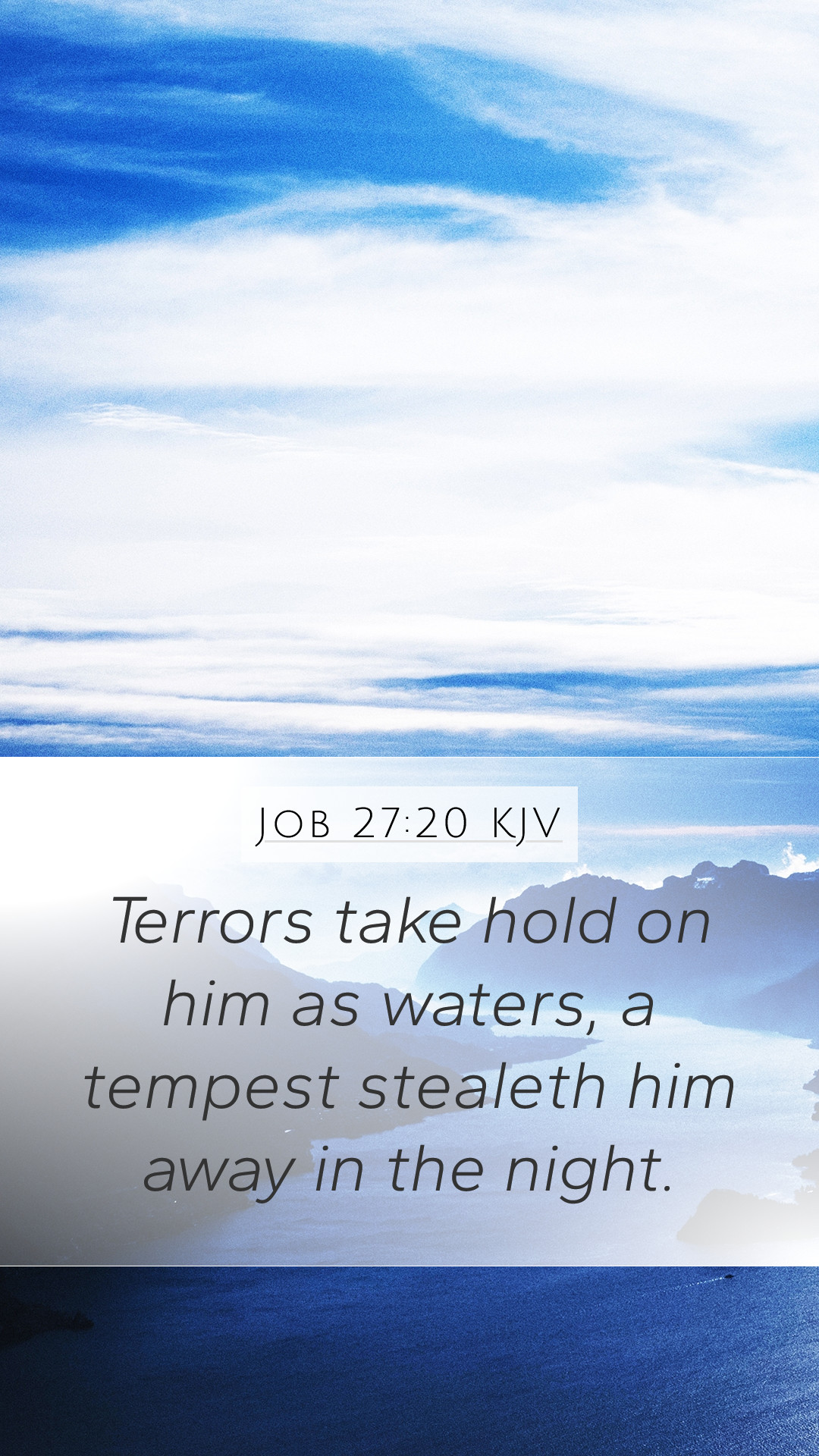Old Testament
Genesis Exodus Leviticus Numbers Deuteronomy Joshua Judges Ruth 1 Samuel 2 Samuel 1 Kings 2 Kings 1 Chronicles 2 Chronicles Ezra Nehemiah Esther Job Psalms Proverbs Ecclesiastes Song of Solomon Isaiah Jeremiah Lamentations Ezekiel Daniel Hosea Joel Amos Obadiah Jonah Micah Nahum Habakkuk Zephaniah Haggai Zechariah MalachiJob 27:20 Meaning
What is the meaning of Job 27:20?
Terrors take hold on him as waters, a tempest stealeth him away in the night.
Job 27:20 Bible Verse Meaning
Understanding Job 27:20
Job 27:20 states, "Terrors overtake him like a flood; a tempest steals him away in the night." This verse provides profound insight into Job's reflections on the suffering of the wicked and the looming judgments they face. Below, we explore the meaning of this scripture through various biblical commentaries.
Summary of Insights
Bible Verse Meanings: Job 27:20 captures the essence of fear, despair, and unexpected judgment that can come upon the unrighteous. It suggests that just as a flood can overwhelm, so too can the consequences of a wicked life catch one off guard, exemplifying the swift nature of divine retribution.
Historical Context: In the context of Job's discourse, he is defending his integrity amidst accusations from his friends who argue that suffering is a result of personal sin. Job asserts that while he remains blameless, the ultimate fate of the wicked should not be ignored.
Commentary Analysis
-
Matthew Henry: Henry emphasizes the inevitability of judgment upon the wicked, comparing their fate to natural disasters, which arrive suddenly and with overwhelming force. He discusses how the terrors presented reflect the inner turmoil that follows a life lived contrary to God's laws.
-
Albert Barnes: Barnes highlights the contrasting states of the righteous and the wicked. He notes that this verse illustrates the despair that accompanies guilt and the terror of impending condemnation. Barnes suggests that Job, in describing this, underscores the certainty of divine justice.
-
Adam Clarke: Clarke provides an analytical approach, focusing on the metaphor of the flood and the tempest. He explains that both images signify unforeseen calamities that come upon the wicked. Clarke interprets the "night" as a symbol of darkness and ignorance, where such individuals are often unaware of their peril until it is too late.
Spiritual Applications
The implications of Job 27:20 extend beyond a mere lamentation. It serves as a sobering reminder of the consequences of one's actions:
- Reflect on Personal Integrity: The verse invites believers to examine their own lives and ensure they are living in a manner consistent with God's statutes.
- Awareness of Divine Justice: It brings awareness to the certainty of God’s justice, urging individuals to heed their spiritual health and motivations.
- Encouragement in Trials: For those suffering, it assures that divine oversight prevails, and encourages reflection on the righteousness of God.
Cross References
Job 27:20 relates to several other scripture passages that further illuminate its meaning:
- Psalm 73:19 - Describes the sudden ruin of the wicked.
- Lamentations 3:47 - Speaks of terror and fear as the result of sin.
- Proverbs 1:27 - Portrays calamity as an eventual outcome for those who ignore wisdom.
Conclusion
In conclusion, understanding Job 27:20 offers rich insights into the nature of divine justice and the fate of the wicked. By analyzing this verse through various commentaries, individuals can deepen their Bible verse interpretations and enhance their Bible study insights. This verse serves not only as a warning but also as an opportunity for self-examination and growth in faith.


